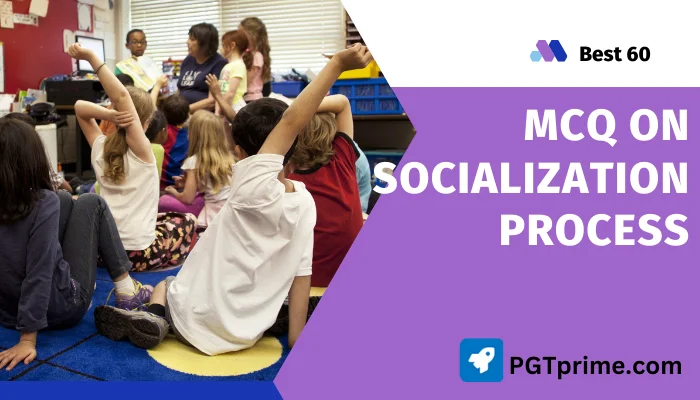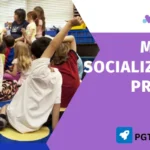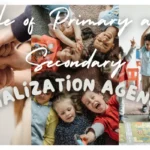The topic “Socialization Process” is a common subject studied in psychology and B.Ed. courses. Its importance extends beyond academic exams, as it is frequently featured in various teaching-related competitive exams. For instance, MCQ on Socialization regularly appears in exams like CTET, DSSSB, state-level exams, and central-level exams such as KVS and NVS. In recent years, numerous questions based on socialization have been asked in these exams.
Today, we will discuss various MCQs related to the socialization process. In this article, we will categorize the questions into different sections, such as MCQ on the Socialization process and its theories, types of socialization, agents of socialization, and example-based MCQ on Socialization.
Before proceeding, it’s essential to have a solid understanding of the different theories and the psychologists who contributed to the study of socialization. Please familiarize yourself with these key figures and their perspectives by referring to your psychology book or B.Ed. textbooks. We have provided a complete list in tabular form for your reference. Be sure to review it thoroughly.
Here’s a compact table listing some major socialization theories and their corresponding psychologists:
| Theory | Psychologist |
|---|---|
| Stages of Cognitive Development | Jean Piaget |
| Social Learning Theory | Albert Bandura |
| Psychosocial Development | Erik Erikson |
| Symbolic Interactionism | George Herbert Mead |
| Attachment Theory | John Bowlby & Mary Ainsworth |
| Looking-Glass Self | Charles Cooley |
| Cultural Capital | Pierre Bourdieu |
| Dramaturgical Analysis | Erving Goffman |
| Moral Development | Lawrence Kohlberg |
| Behavioral Conditioning | B.F. Skinner |
| Sociocultural Theory | Lev Vygotsky |
| Functionalist Perspective | Talcott Parsons |
| Conflict Theory | Karl Marx |
| Feminist Theory | Dorothy Smith & others |
| Ecological Systems Theory | Urie Bronfenbrenner |
Before moving forward, make sure to stay updated with all our latest articles by subscribing to our Telegram channel at t.me/pgtprime and following our Facebook page at facebook.com/pgtprime. Now let’s start.
MCQ on Socialization and its Theories
(1) Which of the following statements best captures the dynamic nature of socialization?
- Socialization is a static process, occurring once in early childhood and remaining unchanged throughout life.
- Socialization is a reciprocal and evolving process where individuals both learn from and influence the norms, values, and beliefs of society throughout their lifetime.
- Socialization is primarily a one-way process where society imposes its norms on the individual without any changes in response.
- Socialization ends once an individual adapts to the workplace environment.
Answer: MCQ on Socialization
(2) Socialization is a reciprocal and evolving process where individuals both learn from and influence the norms, values, and beliefs of society throughout their lifetime.
(2) What is the first step in the socialization process?
- Adapting to the workplace environment.
- Adapting to the broader social environment.
- Adapting to the familiar environment.
- Adapting to the educational environment.
Answer: MCQ on Socialization
(3) Adapting to the familiar environment.
(3) Assertion (A): Socialization is a lifelong process that continues even in adulthood.
Reason (R): Individuals constantly interact with new social institutions, norms, and expectations throughout their lives.
- Both A and R are true, and R is the correct explanation of A.
- Both A and R are true, but R is not the correct explanation of A.
- A is true, but R is false.
- A is false, but R is true.
Answer: MCQ on Socialization
(1) Both A and R are true, and R is the correct explanation of A.
(4) Assertion (A): Socialization only occurs during early childhood and adolescence.
Reason (R): Most important life lessons are learned during these formative years, and there is no significant learning in adulthood.
- Both A and R are true, and R is the correct explanation of A.
- Both A and R are true, but R is not the correct explanation of A.
- A is true, but R is false.
- A is false, but R is true.
Answer: MCQ on Socialization
(4) A is false, but R is true.
(5) How does socialization contribute to the integration of individuals into society?
- It enables individuals to fully conform to societal expectations without questioning them.
- It provides a rigid framework that individuals must follow to be accepted by their peers.
- It facilitates the internalization of societal norms, while also allowing individuals to negotiate their roles within the broader social structures.
- It leads individuals to prioritize societal norms over personal beliefs and values.
Answer: MCQ on Socialization
(3) It facilitates the internalization of societal norms, while also allowing individuals to negotiate their roles within the broader social structures.
Don’t forget to check this out: Role of Primary and Secondary Socialization Agencies ensuring Home-School Continuity: KVS, NCERT, NIOS 2024
(6) Who is considered the father of sociology and the theory of socialization?
- Sigmund Freud
- Karl Marx
- Emile Durkheim
- Max Weber
Answer: MCQ on Socialization
(3) Emile Durkheim
(7) Which of the following is a key aspect of socialization in forming an individual’s identity?
A. Learning professional skills
B. Development of self-concept
C. Preserving social order
D. Building social networks
Answer: MCQ on Socialization
(B) Development of self-concept
(8) How does socialization contribute to cultural continuity?
A. By helping individuals build professional careers
B. By transmitting cultural norms and values across generations
C. By promoting competitive behavior in society
D. By encouraging individuals to focus on their personal goals
Answer: MCQ on Socialization
(B) By transmitting cultural norms and values across generations
(9) Which of the following best describes the role of socialization in understanding social roles?
A. Helps individuals form personal opinions
B. Teaches expectations related to different social roles
C. Promotes individuality over group participation
D. Involves learning how to rebel against norms
Answer: MCQ on Socialization
(B) Teaches expectations related to different social roles
(10) Which theory suggests that socialization is a lifelong process?
- Functionalist theory
- Conflict theory
- Symbolic interactionist theory
- Dramaturgical theory
Answer: MCQ on Socialization
(3) Symbolic interactionist theory
Don’t forget to check this out: KVS TGT Question Paper 2023 with Answer Key
(11) Which of the following best explains how socialization functions within different social institutions (e.g., family, education, media)?
- All institutions socialize individuals uniformly and consistently, without contradictions in their norms and values.
- Different institutions socialize individuals in ways that may sometimes conflict, and individuals must learn to navigate and reconcile these differences.
- Social institutions work together to provide individuals with a singular, cohesive set of values that never changes.
- Only the family and educational systems are responsible for the process of socialization; other institutions play no significant role.
Answer: MCQ on Socialization
(2) Different institutions socialize individuals in ways that may sometimes conflict, and individuals must learn to navigate and reconcile these differences.
(12) How does socialization contribute to the development of “social identity”?
- Socialization strictly enforces a uniform identity for all individuals within a society, limiting personal agency.
- Socialization enables individuals to develop a unique social identity through the internalization of societal norms, roles, and expectations, while also allowing for individual expression.
- Socialization has no impact on the formation of social identity, as it only addresses behavioral expectations, not self-perception.
- Socialization discourages any form of individual identity, focusing only on collective identities based on societal needs.
Answer: MCQ on Socialization
(2) Socialization enables individuals to develop a unique social identity through the internalization of societal norms, roles, and expectations, while also allowing for individual expression.
(13) Which theory of socialization emphasizes the role of language and symbols in the development of self?
- Psychoanalytic theory
- Social learning theory
- Cognitive development theory
- Symbolic interactionism
Answer: MCQ on Socialization
(4) Symbolic interactionism
(14) According to Charles Cooley’s concept of the “looking-glass self”, individuals:
- Shape their identity based on their own internal beliefs
- Develop self-concept through others’ perceptions and reactions
- Learn behavior through observation of others
- Are born with a predetermined self-concept
Answer: MCQ on Socialization
(2) Develop self-concept through others’ perceptions and reactions
(15) Which sociological perspective views socialization as a way to reinforce social inequalities?
- Structural functionalism
- Conflict theory
- Symbolic interactionism
- Postmodernism
Answer: MCQ on Socialization
(2) Conflict theory
Don’t forget to check this out: KVS PGT Question Paper 2023 PDF Download
(16) According to Talcott Parsons, socialization primarily functions to:
- Maintain a balance between individual desires and societal expectations.
- Establish conflict between different classes.
- Instill a revolutionary mindset in individuals.
- Promote self-fulfillment through individualism.
Answer: MCQ on Socialization
(1) Maintain a balance between individual desires and societal expectations
(17) Who is credited with the development of the “Social Learning Theory,” which emphasizes learning behavior through observation and modeling?
- Sigmund Freud
- Albert Bandura
- B.F. Skinner
- Jean Piaget
Answer: MCQ on Socialization
(2) Albert Bandura
(18) In Michel Foucault’s theory of socialization, the concept of “disciplinary power” refers to:
- Direct control by societal institutions
- The imposition of cultural norms by the state
- Control and regulation of behavior through subtle, decentralized mechanisms
- The use of education as a tool of liberation
Answer: MCQ on Socialization
(3) Control and regulation of behavior through subtle, decentralized mechanisms
(19) According to Durkheim’s theory of socialization, the process of “moral education” is important because:
- It helps to control crime and deviance
- It fosters individual creativity
- It strengthens social solidarity and collective conscience
- It encourages political activism
Answer: MCQ on Socialization
(3) It strengthens social solidarity and collective conscience
(20) Which of the following statements best reflects George Herbert Mead’s view on the development of self?
- The self is fully formed at birth and is biologically determined
- The self emerges through a series of social interactions and stages of role-taking
- The self is shaped exclusively by unconscious drives and instincts
- The self is primarily a result of class struggle and economic factors
Answer: MCQ on Socialization
(2) The self emerges through a series of social interactions and stages of role-taking
Don’t forget to check this out: “The Hidden Gems: KVS LDCE Question Paper 2023 download”.
(21) Which of the following best describes the Marxist perspective on socialization?
- Socialization is a neutral process that enables societal cohesion
- Socialization is a process that reinforces class inequalities and perpetuates capitalist ideologies
- Socialization leads to the development of individual personality
- Socialization fosters harmony between different social classes
Answer: MCQ on Socialization
(2) Socialization is a process that reinforces class inequalities and perpetuates capitalist ideologies
(22) Which theorist is associated with the “lifelong socialization” process, emphasizing that socialization continues beyond childhood and adolescence into adulthood?
- Erik Erikson
- George Herbert Mead
- Peter L. Berger
- Norbert Elias
Answer: MCQ on Socialization
(1) Erik Erikson
(23) In Judith Butler’s theory of gender performativity, how does socialization contribute to the construction of gender?
- Through biological determinism
- Through repeated performative acts that reinforce gender norms
- By encouraging individuals to rebel against societal expectations
- By teaching children about biological differences
Answer: MCQ on Socialization
(2) Through repeated performative acts that reinforce gender norms
(24) How does Nancy Chodorow’s psychoanalytic feminist theory explain gender socialization?
- Gender roles are biologically determined and fixed
- Boys and girls are socialized differently based on their relationships with their mothers
- Socialization is irrelevant to the formation of gender identity
- Fathers play the central role in the gender socialization of children
Answer: MCQ on Socialization
(2) Boys and girls are socialized differently based on their relationships with their mothers.
(25) Which of the following is a key focus of Carol Gilligan’s critique of traditional socialization theories, particularly in relation to gender?
- The emphasis on power relations in gender identity formation
- The difference in moral development between men and women
- The role of social media in shaping gender norms
- The impact of class on gender socialization
Answer: MCQ on Socialization
(2) The difference in moral development between men and women
Don’t forget to check it out: All About Pedagogy (PYQ, MCQ) useful in any Teaching Exams.😜
(26) Which of the following is a critique of social learning theory in explaining the socialization process?
- It overlooks the role of unconscious motives in social behavior
- It places too much emphasis on genetic inheritance
- It fails to account for the influence of peer groups
- It assumes that individuals passively absorb societal norms
Answer: MCQ on Socialization
(4) It assumes that individuals passively absorb societal norms
(27) Which psychologist is associated with the concept of “role-taking” in socialization?
- Sigmund Freud
- Jean Piaget
- George Herbert Mead
- Erik Erikson
Answer: MCQ on Socialization
(3) George Herbert Mead
(28) Which of the following statements best reflects Herbert Blumer’s symbolic interactionism perspective on socialization?
- Socialization is a one-way process where society shapes individuals
- Socialization occurs through interaction and the use of symbols, where individuals actively interpret and construct social reality
- Socialization is primarily driven by the economic structures of society
- Socialization is genetically determined and preordained
Answer: MCQ on Socialization
(2) Socialization occurs through interaction and the use of symbols, where individuals actively interpret and construct social reality
(29) Which of the following is a feature of postmodern critiques of traditional socialization theories?
- They emphasize the role of class conflict in shaping identity
- They argue that socialization has become fragmented and unstable in late modernity
- They focus exclusively on the biological aspects of socialization
- They suggest that socialization processes are entirely unconscious
Answer: MCQ on Socialization
(2) They argue that socialization has become fragmented and unstable in late modernity
(30) Which of the following is a key feature of the process of socialization within peer groups?
- It reinforces the norms and values learned in the family
- It allows for testing new roles and identities in a relatively equal social setting
- It enforces formal rules of society
- It focuses on the preservation of culture across generations
Answer: MCQ on Socialization
(2) It allows for testing new roles and identities in a relatively equal social setting
Don’t forget to check it out: All about KVS Where you get Previous Year Question Paper, Eligibility & Syllabus😜
(31) According to Emile Durkheim, the process of socialization helps to maintain which of the following in society?
- Social inequality
- Social solidarity
- Social stratification
- Social mobility
Answer: MCQ on Socialization
(2) Social solidarity
(32) Which concept refers to the process by which individuals learn to behave appropriately according to their social status and role?
- Role exit
- Social roles
- Role-taking
- Gender identity
Answer: MCQ on Socialization
(3) Role-taking
(33) Which theory of socialization emphasizes the role of rewards and punishments in shaping behavior?
- Cognitive developmental theory
- Social learning theory
- Psychoanalytic theory
- Structural functionalism
Answer: MCQ on Socialization
(2) Social learning theory
MCQ on Types of Socialization
(33) Which of the following is NOT a characteristic of primary socialization?
- It occurs during early childhood
- It is primarily influenced by the family
- It involves learning specific skills for a career
- It shapes the core personality of an individual
Answer: MCQ on Socialization
(3) It involves learning specific skills for a career
(34) Match the following types of socialization in List I with their descriptions in List II:
| List I (Types of Socialization) | List II (Descriptions) |
|---|---|
| 1. Primary Socialization | A. Unlearning old behaviors and adopting new ones, often in a new environment. |
| 2. Secondary Socialization | B. Involves learning norms and values to function in professional or organizational roles. |
| 3. Anticipatory Socialization | C. Takes place in early childhood, primarily influenced by family and close caregivers. |
| 4. Developmental Socialization | D. Occurs in later childhood and adolescence, often through schools and peer groups. |
| 5. Resocialization | E. Voluntary adoption of values and norms of a group one aspires to join. |
| 6. Organizational Socialization | F. Ongoing process of learning new behaviors as one transitions through life stages. |
| 7. Gender Socialization | G. Socialization related to the societal norms and expectations regarding gender roles. |
- 1 (C), 2 (D), 3 (E), 4 (F), 5 (A), 6 (B), 7 (G)
- 1 (D), 2 (A), 3 (E), 4 (G), 5 (F), 6 (B), 7 (C)
- 1 (E), 2 (D), 3 (C), 4 (F), 5 (A), 6 (B), 7 (G)
- 1 (A), 2 (D), 3 (E), 4 (F), 5 (G), 6 (B), 7 (C)
Answer: MCQ on Socialization
(1) 1 (C), 2 (D), 3 (E), 4 (F), 5 (A), 6 (B), 7 (G)
(35) What is the type of socialization where individuals adopt the behaviors or standards of a group they wish to do and join in the future?
- Reverse socialization
- Anticipatory socialization
- Resocialization
- Developmental socialization
Answer: MCQ on Socialization
(2) Anticipatory socialization
Don’t forget to check it out: Haryana HPSC PGT Screening Paper PDF 2023😜
(36) In which type of socialization are individuals required to unlearn old norms and behaviors and adopt new ones after undergoing a major life transition?
- Primary socialization
- Anticipatory socialization
- Resocialization
- Informal socialization
Answer: MCQ on Socialization
(3) Resocialization
(37) Which of the following is a key characteristic of secondary socialization?
- It occurs primarily in childhood
- It reinforces the norms and values learned during primary socialization
- It is unrelated to formal institutions
- It is an unconscious process
Answer: MCQ on Socialization
(2) It reinforces the norms and values learned during primary socialization
(38) Which type of socialization focuses on the ongoing process of learning and refining social skills, behaviors, and norms as individuals grow and adapt throughout their life?
- Primary socialization
- Developmental socialization
- Anticipatory socialization
- Resocialization
Answer: MCQ on Socialization
(2) Developmental socialization
(39) Which type of socialization involves adapting to new environments and cultures, often after immigrating to a new country or joining a new organization?
- Primary socialization
- Developmental socialization
- Anticipatory socialization
- Resocialization
Answer: MCQ on Socialization
(4) Resocialization
(40) How does primary socialization differ in shaping the foundational identity of an individual compared to secondary socialization, particularly in contexts of early childhood development within diverse cultural frameworks?
- Primary socialization establishes universal behavioral norms, while secondary socialization is more culture-specific.
- Primary socialization forms the core identity and values through close familial interaction, whereas secondary socialization refines these through external institutions like schools or peer groups.
- Primary socialization is focused solely on professional behavior, unlike secondary socialization which is concerned with familial roles.
- Primary socialization occurs later in life, allowing for greater adaptability in different social contexts than secondary socialization.
Answer: MCQ on Socialization
(2) Primary socialization forms the core identity and values through close familial interaction, whereas secondary socialization refines these through external institutions like schools or peer groups.
Don’t forget to check it out: All about HTET ( Level 2 & 3)😜
MCQ on Agents of Socialization
(41) Which of the following is an agent of secondary socialization?
- Peer group
- Family
- Government
- Neighborhood
Answer: MCQ on Socialization
(1) Peer group
(42) Which of the following is NOT considered a formal agent of socialization?
- Schools
- Family
- Religious institutions
- Peer groups
Answer: MCQ on Socialization
(4) Peer groups
(43) Which of the following is not considered an agent of socialization?
- Family
- Peers
- Media
- Genetics
Answer: MCQ on Socialization
(4) Genetics
(44) Which of the following statements accurately reflects the role of different agents of socialization?
- The family serves as the primary agent of socialization by introducing basic values, while teachers and schools primarily focus on developing specialized skills and formal knowledge.
- Teachers are the most important agents of socialization because they shape a child’s core values, while the family plays a secondary role.
- Schools primarily teach emotional development, whereas families focus on intellectual growth.
- Family and teachers serve similar roles, both exclusively focused on imparting academic skills and preparing individuals for professional life.
Answer: MCQ on Socialization
(1) The family serves as the primary agent of socialization by introducing basic values, while teachers and schools primarily focus on developing specialized skills and formal knowledge.
MCQ on Socialization based on Examples
(45) Which of the following is an example of informal socialization?
- Attending a training session at work
- Learning how to behave from observing peers
- Participating in a formal school education
- Completing a professional course
Answer: MCQ on Socialization
(2) Learning how to behave from observing peers
Don’t forget to check this out:
Why PGT Teacher is the best career choice for you in 2024?
(46) Which of the following is an example of anticipatory socialization related to the “looking-glass self” concept by Charles Cooley?
- An individual imagines how others perceive them and adjusts their behavior accordingly
- A Child learning norms from their parents
- A person preparing for retirement by practicing hobbies they will pursue after quitting their job
- A student completing an internship to understand work-life balance
Answer: MCQ on Socialization
(1) An individual imagines how others perceive them and adjust their behavior accordingly
(47)When a child learns to say “please” and “thank you” by observing their parents, this is an example of:
- Cognitive socialization
- Structural socialization
- Social learning
- Resocialization
Answer: MCQ on Socialization
(3) Social Learning
(48)A teenager starts dressing and speaking in a way similar to their peers to fit in. This is an example of:
- Anticipatory socialization
- Peer socialization
- Primary socialization
- Cultural socialization
Answer: MCQ on Socialization
(1) Anticipatory socialization
(49) When new employees undergo training to understand the norms and values of their workplace, this is called:
- Informal socialization
- Professional socialization
- Organizational socialization
- Group socialization
Answer: MCQ on Socialization
(3) Organizational socialization
(50)When a student observes how classmates behave in a new school and starts mimicking those behaviors, this is known as:
- Peer socialization
- Anticipatory socialization
- Secondary socialization
- Professional socialization
Answer: MCQ on Socialization
(1) Peer socialization
Don’t forget to check this out: Best 30 NCF 2023 MCQ Questions for Aspirants.
(51)A child learning religious practices from their family members is an example of:
- Cultural socialization
- Resocialization
- Primary socialization
- Organizational socialization
Answer: MCQ on Socialization
(3) Primary socialization
(52) When individuals use the behaviors of people they admire as a guide for their own behavior, it is called:
- Reference group socialization
- Reciprocal socialization
- Developmental socialization
- Role-taking socialization
Answer: MCQ on Socialization
(1) Reference group socialization
(53) A person learning the etiquette required for formal dining by watching videos is an example of:
- Informal socialization
- Media socialization
- Organizational socialization
- Peer socialization
Answer: MCQ on Socialization
(2) Media socialization
(54) A new resident in a foreign country adopting the language and customs of their new home is undergoing:
- Acculturation
- Primary socialization
- Desocialization
- Anticipatory socialization
Answer: MCQ on Socialization
(1) Acculturation
(55) When a child learns to respect elders by observing their parents and teachers, this is an example of:
- Observational socialization
- Social learning
- Peer socialization
- Anticipatory socialization
Answer: MCQ on Socialization
(2) Social learning
Don’t forget to check this out: Top 50 NEP 2020 MCQ for Exam
(56) A college student preparing for a future career by doing an internship is an example of:
- Professional socialization
- Secondary socialization
- Anticipatory socialization
- Resocialization
Answer: MCQ on Socialization
(3) Anticipatory socialization
(57) A young adult changes their behavior and dress after joining a new social group at university. This is an example of:
- Cognitive socialization
- Peer socialization
- Resocialization
- Secondary socialization
Answer: MCQ on Socialization
(2) Peer socialization
(58) Children playing “school” and mimicking a teacher’s role is an example of:
- Role-playing socialization
- Cognitive socialization
- Developmental socialization
- Symbolic socialization
Answer: MCQ on Socialization
(1) Role-playing socialization
(59) Which of the following is an example of gender socialization?
- Teaching children how to use technology
- Encouraging boys to play with cars and girls to play with dolls
- Training employees in workplace policies
- Preparing for retirement through financial planning
Answer: MCQ on Socialization
(2) Encouraging boys to play with cars and girls to play with dolls
(60) When a child from a rural area moves to a city and adopts the urban way of life, including new customs and habits, this process is known as:
- Primary socialization
- Desocialization
- Resocialization
- Secondary socialization
Answer: MCQ on Socialization
(3) Resocialization
Please let us know through the comment section if you want any topic to be discussed in this blog. We will try to provide an article on that subject as early as possible.
Please leave your valuable comment in the comment box! Your comments are valuable to us.











